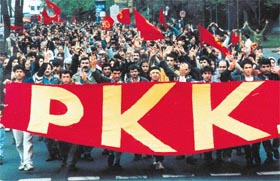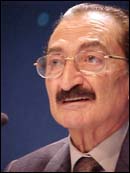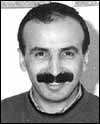18
July 2001
![]()
2. "EU warns Turkey it can't block plans to use NATO facilities for European defense force", The European Union warned Turkey on Monday that it would not allow that nation to permanently block EU plans to set up a defense force that would use NATO's military facilities.
3. "The ban on PKK reached a deadlock", Magazine Der Spiegel wrote that Kurds could not be charged with taking part in the actions in declaration of identity campaign because of "piling of dossiers".
4. "TUSIAD oppose technocratic government", Turkish Businessmen's and Industrialists' Association (TUSIAD), in a written statement, announced on Tuesday that a technocratic government is a anti-democratic solution.
5. "Ecevit Rejects Calls to Step Aside", Prime Minister Bulent Ecevit on Monday rejected calls in the media for his administration to step down in favor of a "technocrat government" to steer Turkey through a deepening economic crisis that has seen its currency lose half its value against the dollar.
6. "They want to finish the conspiracy using the Kurds", PKK Council of Leaders member Mustafa Karasu said that they wanted to complete the international conspiracy with the Kurds. Karasu participated by telephone in the Gundem (Agenda) program moderated by Sercan Aydin on Medya-TV the other evening, with journalist Ahmat Akkaya and Cihan Eren participating as studio guests on the program.
1. - AFP - "Turkey cited for unfair trial of former Kurdish deputies":
STRASBOURG
The European Court of Human Rights ruled Tuesday that jailed Kurdish
former deputy Leyla Zana and three other ex-members of parliament had
received an unfair trial in Turkey. The four were sentenced to 15 years
in prison by the Ankara State Court in 1994 for separatist activities
and links to the outlawed Kurdistan Workers Party (PKK) of Abdullah
Ocalan.
The PKK took up arms against Ankara in 1984 for Kurdish self-rule in the predominantly Kurdish southeast. The court ruled Tuesday there had been a violation of article 6 of the European Convention on Human Rights because the Ankara court, which included a military judge, was not "an independent and impartial tribunal." "The court further held, unanimously, that the applicants' rights ... had been violated, in that they were not informed in time of modifications to the charges against them and that they had not been able to have key witnesses questioned," a statement from the court said. In their petition, the four had complained that they were convicted of "putting forward, as parliamentarians, the views of the Kurdish population in Turkey and of having developed peaceful solutions to the Kurdish problem." The court, in a unanimous decision, ordered that each plaintiff receive 25,000 dollars (29,400 euros) in damages and 10,000 dollars in expenses.
The court decided not to rule on other complaints from
the four related to freedom of expression, freedom of association and
the ban on discrimination. Diplomatic sources said the ruling could
lead the 43-member Council of Europe to demand a review of the cases
of Zana, Selim Sadak, Hatip Dicle and Ohran Dogan, that could result
in their release from jail. All four were members of parliament and
belonged to the now-defunct Democracy Party (DEP). Zana, who is currently
in Ulucanlar prison in Ankara where she has been visited several times
by European parliamentarians, received the European Parliament's Sakharov
freedom of thought award while in prison in 1995. The DEP's 15 members
of parliament, among them Zana, entered parliament on a social democratic
ticket in 1991 and caused an uproar by taking their oaths in Kurdish
instead of Turkish, the official language. Three years later, the party
was banned with some of its administrators being sentenced to jail for
collaborating with the PKK and some fleeing to Europe in anticipation
of lengthy jail terms. ![]()
2. - AP - "EU warns Turkey it can't block plans to use NATO facilities for European defense force":
BRUSSELS
The European Union warned Turkey on Monday that it would not allow
that nation to permanently block EU plans to set up a defense force
that would use NATO's military facilities.
"The foreign and security policy of the European Union cannot be dependent on an outside country," said Belgian Foreign Minister Louis Michel, who spoke for the 15-nation bloc after a meeting.
"We hope Turkey will understand that the European Union will not give in to such pressure."
A member of NATO, but not the EU, Turkey has been holding up EU plans to set up a 60,000 person rapid reaction force by refusing to allow the proposed force automatic access to NATO's planning facilities and other assets such as intelligence, communications and transport.
Turkey maintains it should have say over how and when the European Union can use NATO assets.
European Union officials warned that the impasse could harm Turkey's ambitions to open membership negotiations in an effort to join the European bloc in the future.
Last month, Germany said European help to Turkey's troubled economy could also be dependent on progress on the NATO issue.
The EU hopes to field the force by 2003 for use in peacekeeping or humanitarian crises in which NATO does not want to get involved. To avoid expensive duplication, the Europeans want to use NATO facilities.
Turkey is adamant that it must have a strong voice in any European Union decision to mount a military operation using NATO assets, or any operation that would affect what Turkey considers its sphere of interest.
Negotiations have been under way since last year. Because NATO operates by consensus, Turkey has an effective veto over any decision. European officials have said that the Turkish government has come close to an understanding, but the country's powerful military continues oppose a settlement.
The EU agreed in 1999 that Turkey could be considered a candidate for membership, but unlike Cyprus, Malta and 10 eastern European nations, it has not opened membership talks.
The EU wants to see more progress on human rights and
a willingness to help end the division of Cyprus, where Turkey troops
help support a breakaway government in the north.![]()
3. - Kurdish Observer - "The ban on PKK reached
a deadlock":
Magazine Der Spiegel wrote that Kurds could not be charged with taking
part in the actions in declaration of identity campaign because of "piling
of dossiers".
The German government which banned PKK (Kurdistan Workers' Party) in 1993 and assumed an anti-democratic stance as far as Kurds were concerned is now desperate on the subject of declaration of identity campaign. German officials, confirming that more than 10 thousand signatures were submitted to the courts, are reluctant to charge them.
According to a news in magazine Der Spiegel, 2500, 2000, 3000 Kurds respectively in Berlin, Bremen and North Rhein Westfallen State applied to the courts. The number of Kurds were about 10 thousand and is expected to exceed 30 thousand.
"Organizers" are "wanted"
While the legal procedure is not clear, it is concluded that activists
are not charged and the ones who have signed the statement "I am
the PKK" are considered as sympathizers to PKK and this does not
constitute a crime.
The way they found in order to block the way is simple: To charge not the activists but the organizers of the campaign.
What about the ban on PKK?
Ministers of Interior Affairs the states in Germany have the authority to decide whether the ban on PKK is lifted or not. But Organization for Defending the Constitution is for lifting the ban. Intelligence service and deputies of Greens and Unity 90 assume the same stance on the matter too. But ministers of interior affairs insist on the ban.
Otto Schilly, Federal Minister of Interior Affairs, is
reluctant to cause problem in the relations with Turkey. Ankara government
too asks for everybody taking part in the campaign to be charged and
insists on this. ![]()
4. - Turkish Daily News - "TUSIAD oppose technocratic government":
Turkish Businessmen's and Industrialists' Association (TUSIAD), in a written statement, announced on Tuesday that a technocratic government is a anti-democratic solution.
TUSIAD's announcement stated that Turkey's development and putting the market economy into a track are based on healthy democratic system.
"Separating these two subjects from each other, and trying to find an anti-democratic solution in order to recover from this emergency situation are wrong attitudes," the TUSIAD announcement pointed out.
The TUSIAD report said that a technocratic government would not solve Turkey's short term problems, in contrast, it will lead to a confidence crisis by increasing a political and economic crisis.
"The anti-democratic solutions will mean Turkey's
shift from its goal to be integrated into the western world, and will
shadow all the steps taken for the democratization process," the
announcement stated. ![]()
5. - International Herald Tribune - "Ecevit Rejects Calls to Step Aside":
ISTANBUL
Prime Minister Bulent Ecevit on Monday rejected calls in the media
for his administration to step down in favor of a "technocrat government"
to steer Turkey through a deepening economic crisis that has seen its
currency lose half its value against the dollar.
The calls for a new government made up solely of economic experts were "shaking the foundations of democracy," Mr. Ecevit said in a written statement.
His remarks came as officials from the International Monetary Fund began another round of talks in Ankara to review Turkey's progress in implementing a recovery program. The talks are on the next, $1.5 billion installment of a $15.7 billion loan.
The Fund said Monday that the risk of financial contagion from Turkey and another troubled emerging market, Argentina, remained small. Europe's potential vulnerability, via the exposure of Spanish banks to Argentina, also is not a problem, it said.
"We believe the international financial system is experiencing relatively little contagion from Argentina and Turkey," said Garry Schinasi, co-author of the Fund's annual international capital markets survey.
The Fund announced Monday, however, that its managing director, Horst Koehler, was cutting short a European trip, as Argentina fights to avoid a default on its debt. Mr. Koehler was to have met this week with European Union officials in Brussels and German officials in Frankfurt.
In late trading Monday, Argentine bond prices fell further,
amid a disagreement over budget cuts that the government seeks to help
it meet debt payments.
.
In Turkey, interest rates on Treasury bonds have climbed to more than
100 percent as the financial crisis deepens, raising fears that Turkey
will be unable to service that debt. The government spent 92 percent
of its tax revenue in the first half of 2001 on interest payments, Finance
Minister Sumer Oral said Monday.
Stanley Fischer, first deputy managing director of the Fund, said Saturday that its loan program might have to be revised if interest rates do not begin to fall.
Interest rates were moving the other way Monday as the Central Bank raised overnight rates by four points to 67 percent, a move that surprised markets a day ahead of a scheduled debt rollover.
The move failed to damp demand for foreign currency as the lira slipped to another record low against the dollar.
Turkish newspapers have begun to speculate on the possibility of a "technocrat government" to see Turkey through the worsening crisis, which has thrown an estimated half-million people out of work and caused thousands of businesses to fold.
Turkey needs a government "that will make it a modern country," a columnist, Serdar Turgut, wrote in the mass-circulation daily Hurriyet. "The realistic solution is a temporary technocratic government with support from all sections of society, including politicians."
But Mr. Ecevit called for an end to such speculation from
the media. "Those who for right or wrong reasons are reacting against
our administration must refrain from casting a shadow over democracy,"
he said. ![]()
6. - Ozgur Politika - "They want to finish the
conspiracy using the Kurds": 
PKK Council of Leaders member Mustafa Karasu said in a statement given
by telephone to a talk show program on Medya TV that there were plans
to complete the international conspiracy by using the Kurds. Karasu
participated in the Gundem (Agenda) program moderated by Sercan Aydin
on Medya-TV the other evening, with journalist Ahmat Akkaya and Cihan
Eren participating as studio guests on the program.
Mustafa Karasu said that they found the admission by Anthony Blinken, special advisor to former US President Bill Clinton, of the US's role in the abduction of PKK President Abdullah Ocalan and the latest details concerning the role of Greece in the conspiracy to be 'cautionary lessons,' and appraised the US's approach as "grave," "dangerous," and "completely unacceptable." Karasu said that they did not take the statements seriously because "the apology was worse than the offense," adding, "If they are in favor of a solution, let them put their policies forward."
Harsh criticism of Germany
The PKK Council of Leaders member also harshly criticized the negative stance of Germany against the Kurds. Karasu pointed out that Germany was carrying out activities against the Kurds, continuing to say the following: "Germany must abandon this stance. Why are they going to liquidate the Kurds? The path will be opened to others. It is a fantasy; no one's path will be cleared. If that's how Germany is thinking, it won't happen."
Kurds are being used
Karasu gave the message that if the PKK had been liquidated with the international conspiracy, "all the truths would have remained dark pages of history." Karasu also pointed out to the role of Kurds in the conspiracy, saying the following: "We know what the KDP [Kurdistan Democratic Party] did, what part the Greeks, the Europeans, took. Nothing will remain secret. Those who took part in the conspiracy must approach the Kurds with self-criticism. The will of the Kurdish people is not determined by that of the US, of Europe. The Kurdish people will determine this. Everyone is still listening to the PKK today."
KDP and PUK are making plans
Karasu said that there existed Kurds who were spitting out the anger and vengeance they had inside, adding the following: "They exist to confuse people's heads; it's not because they are going to do anything serious. The Kurdish people must be aware, careful against these. All Kurds must be behind the struggle for identity; those who aren't should stand back." Karasu said that they wanted to complete the international conspiracy with the Kurds and said that the KDP and PUK were making plans with Turkey.
Karasu had the following to say: "Turkish soldiers have entered [Iraqi Kurdistan]; there are operations in various places. We are warning the Turkish state to give up using the Kurds. This will not bring results. A democratic solution must come; the natural rights of the Kurds, their linguistic, cultural, and similar rights must be accepted. Otherwise, very serious economic and political results could arise. Errors must not be made. The Kurds must not be used."
Call to Kurdish organizations
Karasu also made a call to the Kurdish organization, calling
on them to give up their negative stances. Karasu said that "the
PKK exists to develop a solution" and continued to say the following:
"Those who are acting out of enmity to the PKK today are giving
strength to the KDP and PUK. We are calling out to them. Don't provoke
and incite. We genuinely do not want to fight with anyone. We told the
PUK not to do this before the war; we told them not to squeeze our throats.
They had rather stop attacking the PKK just because the Turkish state
wants it that way, just because the international conspirators want
it that way, just because a little money will come. We are warning the
KDP and PUK one more time; we want to live in friendship and brotherhood
with everyone. We want to develop national peace amongst the Kurds.
We are calling all intellectuals and personalities to exert effort for
peace amongst the Kurds and to stop the conspiracy. Even those engaging
in Kurdish nationalism today are doing it because we exist. If our existence
came to an end, they wouldn't be able to engage in Kurdish nationalism...
We are calling to the people of Suleymaniya, Duhok, and Hewler [Arbil].
They can stop these policies." ![]()